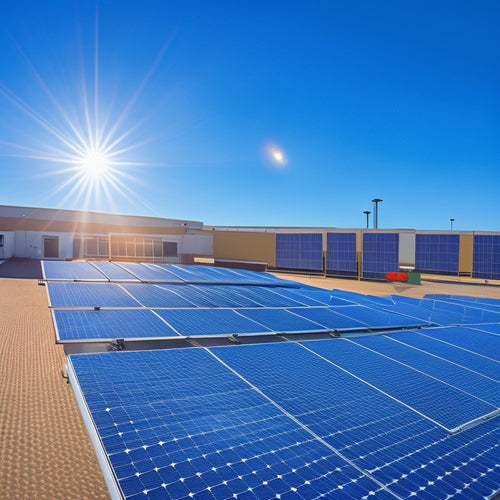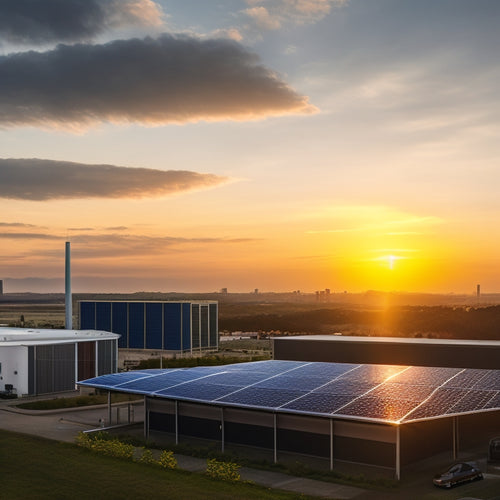
Solar Panels With Batteries Cost
Share
When you install solar panels with batteries, you can expect to pay between $15,000 and $30,000 or more, depending on the system size, battery type, and installation complexity. This upfront cost is offset by long-term energy savings and increased property value. With solar panels and batteries, you'll gain energy independence at night, storing excess energy generated during the day for nighttime use. You'll also reduce your reliance on the grid during peak hours, lowering your energy bills. As you examine the benefits of solar panels with batteries, you'll uncover more ways to optimize your energy consumption and maximize your return on investment.
The Essentials
- Total upfront cost of solar panels with batteries depends on system size, battery type, and installation complexity, ranging from $15,000 to $30,000 or more.
- While higher upfront costs, solar panels with batteries can save homeowners up to $1,000 annually on electricity bills and increase property value.
- Battery type and quality significantly impact overall system cost, with lithium-ion batteries being more expensive than lead-acid batteries.
- Installation costs can be recouped through higher selling prices, and financing options can offset upfront costs, making solar panels with batteries a worthwhile investment.
- Regular maintenance of solar panels and batteries is essential to ensure longevity, efficiency, and optimal performance, adding to overall system cost.
Energy Independence at Night
You can now power through the darkness with solar panels and batteries, ensuring your home or business remains operational even when the sun isn't shining.
By storing excess energy generated during the day, you can tap into it at night, achieving grid-free nighttime operations.
With a reliable Solar Energy Storage solution, you can alleviate the burden of high energy bills and reduce grid dependence, providing you with greater energy independence and potential cost savings.
This means you'll have a reliable source of energy, 24/7, without relying on the grid.
Powering Through Darkness
By nightfall, when the sun's energy is no longer available, homeowners with solar panels often rely on the grid to power their homes, sacrificing some of the energy independence they sought.
However, with the addition of solar batteries, you can continue to power your home through the night, maintaining your energy independence. This is possible due to the advanced technology of solar batteries, which store excess energy generated by your solar panels during the day for use at night.
Furthermore, by leveraging Lithium Ion Batteries, homeowners can optimize their energy storage and reduce their reliance on traditional power systems. In addition, this approach can also help alleviate the costs associated with peak-hour energy usage by storing excess energy generated during off-peak hours for later use.
To maximize your energy independence, it's crucial to prioritize solar efficiency and battery maintenance. This includes ensuring your solar panels are clean and well-maintained to optimize energy production, as well as monitoring your battery's state of charge and depth of discharge to prolong its lifespan.
Grid-Free Nighttime Operations
Solar batteries enable homeowners to sever their reliance on the grid during nighttime hours, when energy demand is typically high. This means you can enjoy the comfort and convenience of electricity without worrying about the grid's limitations. With solar panels and batteries, you can store excess energy generated during the day for use at night, reducing your nighttime energy costs.
| Grid-Tied System | Grid-Free System |
|---|---|
| Relies on grid for nighttime power | Uses stored solar energy for nighttime power |
| Inefficient, as excess energy is wasted | Efficient, as excess energy is stored for later use |
| Prone to outages and blackouts | Unaffected by outages and blackouts |
| Limited energy independence | Total energy independence |
Increased Property Value
You'll likely see an enhancement in your property's value with solar panels and batteries, thanks to the increased appeal to environmentally conscious buyers and the promise of energy independence.
In fact, studies have shown that homes with solar panels sell for higher prices, with some estimates suggesting a premium of up to 17%.
By considering cost of solar panels and exploring affordable energy solutions, you can make an informed decision about investing in solar panels with batteries.
Additionally, reducing your reliance on the grid with residential solar panel prices can further increase your property's appeal.
Higher Selling Prices
One significant advantage of installing solar panels with batteries is that they can increase your property's value, potentially leading to higher selling prices. This enhancement in value can be substantial, with some studies suggesting that solar panels can increase your property's value by up to 17%.
When you decide to sell your property, you can expect to recoup a significant portion of your installation costs. In fact, the National Renewable Energy Laboratory estimates that you can recover up to 97% of your solar panel investment through increased property value.
When you're considering financing options for your solar panel installation, keep in mind that the increased selling price can also offset the upfront costs. This means you can enjoy the benefits of solar energy while also increasing your property's value.
As you weigh the costs and benefits of solar panels with batteries, remember that the long-term advantages can be significant. By investing in solar energy, you're not only reducing your reliance on the grid, but you're also making a smart investment in your property's future.
Energy Independence Boost
Having a backup power source in place can be a major selling point for potential buyers, as it guarantees their home will remain powered even during grid outages.
You'll enjoy increased residential autonomy, knowing your home is self-sufficient and less reliant on the grid. This added value can enhance your property's appeal, making it more attractive to potential buyers who prioritize renewable reliability.
When you invest in solar panels with batteries, you're not only reducing your reliance on the grid but also increasing your property's value. This energy independence enhancement can lead to higher selling prices, as buyers are willing to pay a premium for the peace of mind that comes with having a reliable backup power source.
In today's market, homeowners are seeking freedom from grid dependence and the uncertainty that comes with it.
Deep Cycle Battery Types
You'll want to evaluate two key factors when selecting a deep cycle battery: its lifespan and cycle depth.
When it comes to renewable energy solutions, a reliable deep cycle battery is essential for off-grid power backup and reduced bills residential solar power.
The lifespan of a deep cycle battery is influenced by aspects like charging/discharging frequency, temperature, and maintenance, which affect its overall durability.
Understanding how cycle depth impacts your battery's performance will help you choose the right type for your solar panel system, ensuring ideal energy storage and release.
Battery Lifespan Factors
Deep cycle battery lifespan is markedly impacted by the type of battery you choose. As you examine your options, it's crucial to evaluate the factors that influence battery longevity. You'll want to select a battery that aligns with your energy needs and priorities.
For instance, if you're concerned about environmental impact, you may opt for a battery made from recyclable materials or one with a lower carbon footprint.
Proper battery maintenance also plays a critical role in extending lifespan. You'll need to regularly inspect and maintain your batteries to verify they're operating within the recommended parameters. This includes monitoring temperature, voltage, and charging cycles to prevent premature degradation.
When it comes to deep cycle batteries, you have a range of options, including lead-acid, lithium-ion, and nickel-cadmium. Each type has its unique characteristics, advantages, and disadvantages.
Cycle Depth Matters
Plunge into the world of deep cycle batteries and you'll quickly uncover that cycle depth is a critical factor in determining their overall performance and lifespan. Cycle depth, or the percentage of a battery's capacity that's used during each cycle, has a significant impact on battery efficiency and cycle longevity.
| Cycle Depth | Battery Efficiency |
|---|---|
| 50% | 80% - 90% |
| 70% | 70% - 80% |
| 80% | 60% - 70% |
| 90% | 50% - 60% |
As you can see, the deeper the cycle, the lower the battery efficiency. This means that batteries with a higher cycle depth will have a shorter lifespan. For example, a battery with a cycle depth of 50% will last longer than one with a cycle depth of 90%. When selecting a deep cycle battery, it's crucial to evaluate your energy needs and choose a battery with a cycle depth that meets those needs. By doing so, you can maximize your battery's efficiency and longevity, ensuring you have the power you need when you need it.
Check Your Energy Usage
You'll need to track your energy consumption to determine the right size of your solar panel system and battery storage.
Start by monitoring your daily usage patterns to identify peak hours, average consumption, and overall energy requirements.
Consider investing in a residential solar energy system that integrates seamlessly with a battery backup solution.
This will enable you to store excess energy generated during the day for use during peak hours or at night.
This information will help you determine the ideal configuration for your solar panels and batteries.
Tracking Energy Consumption
Your energy usage pattern plays a significant role in determining the size and type of solar panel system you need. To get an accurate assessment, you'll want to track your energy consumption. This involves monitoring your energy usage pattern over a period of time, typically a year, to identify your peak usage periods and overall energy requirements.
Energy monitoring devices can help you track your consumption in real-time, providing useful observations into your energy usage habits. By analyzing this data, you can identify areas of inefficiency and opportunities to reduce your energy consumption.
Consumption tracking also helps you determine the best size of your solar panel system, ensuring you generate enough power to meet your energy needs. With this information, you can make informed decisions about your energy usage and create a more sustainable energy plan that aligns with your goals.
Daily Usage Patterns
By examining your daily energy usage patterns, you can pinpoint the times of day when your energy consumption spikes. This information is vital in determining the size of the solar panel system and battery storage you need to meet your energy demands.
Understanding your energy habits and consumption patterns helps you identify areas where you can make adjustments to reduce your energy usage.
For instance, you might find that your energy consumption peaks in the morning when you're getting ready for work or in the evening when you're cooking dinner. By identifying these patterns, you can optimize your energy usage by shifting non-essential loads to off-peak hours or investing in energy-efficient appliances.
Additionally, this information enables you to size your solar panel system and battery storage accurately, ensuring that you have a reliable source of energy when you need it most.
Lower Grid Dependence Rate
You'll see a significant reduction in your energy bills when you opt for solar panels with batteries, as you'll be relying less on the grid for your power needs.
This decrease in grid dependence translates to lower electricity costs, which can lead to substantial savings over time.
Reduced Energy Bills
How much can solar panels with batteries really save you on your energy bills? The answer lies in your ability to utilize and store renewable energy.
With a solar panel system, you can generate electricity during the day and store excess energy in a battery for later use. This reduces your reliance on the grid, leading to significant savings.
By implementing energy-efficient savings strategies, you can maximize your energy independence. For example, you can program your system to charge your battery during off-peak hours when energy rates are lower. This not only reduces your energy bills but also increases your overall energy efficiency.
Additionally, you can optimize your energy usage by shifting non-essential loads to off-peak hours, further decreasing your energy expenditure.
Frequently Asked Questions
Do Solar Panels With Batteries Still Work During Power Outages?
You'll be glad to know that solar panels with batteries can still provide power during outages, thanks to the stored energy in the battery, which is replenished by the solar panel's efficiency, and its storage capacity allowing you to stay connected.
Can I Charge My Electric Vehicle With a Solar Panel System?
You can charge your electric vehicle with a solar panel system, ensuring EV compatibility, by selecting a solar charging solution that meets your vehicle's power requirements, and configuring the system to prioritize EV charging when the sun shines.
Are Solar Panels With Batteries Eligible for Government Incentives?
You're likely eligible for government incentives when installing solar panels with batteries, which can greatly increase your financial savings; investigate federal and state programs, such as the Solar Investment Tax Credit, to maximize your returns.
How Long Do Solar Panels With Batteries Typically Last?
You'll be thrilled to know that NASA's solar panels have been operating in space for over 40 years! On Earth, your solar panels typically last 25-30 years, while batteries experience 10-15% capacity loss per decade due to degradation, ensuring a reliable energy supply for your freedom-seeking lifestyle.
Can I Add Batteries to My Existing Solar Panel System?
You can add batteries to your existing solar panel system if it's compatible, but you'll need to assess system compatibility and guarantee seamless battery integration, which may require upgrades to your inverter or monitoring system.
Final Thoughts
You've made a significant investment in solar panels with batteries, and it's time to reap the benefits. With energy independence at night, you can power your home even when the sun goes down. Consider the example of a California homeowner who installed a 5kW solar panel system with a 10kWh battery bank. They reduced their grid dependence rate by 90%, saving $1,500 on their annual energy bill. By choosing the right deep cycle battery type and checking your energy usage, you can maximize your savings and enjoy a higher property value.
Related Posts
-

Top Camping Water Bottles for Adventure
When you're out adventuring, picking the right camping water bottle is essential for staying hydrated. Look for durab...
-

Essential Solar Panel Mounts for Commercial Properties
When it comes to essential solar panel mounts for your commercial property, durability and wind resistance are key fa...
-

Advantages of Commercial Solar Battery On-Site Storage
By investing in a commercial solar battery on-site storage system, you can greatly reduce your energy grid dependence...


